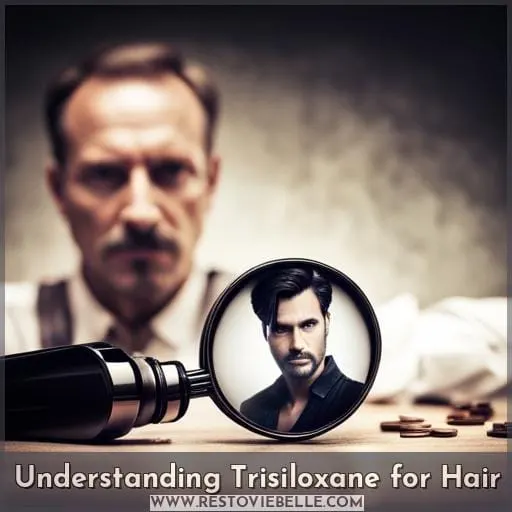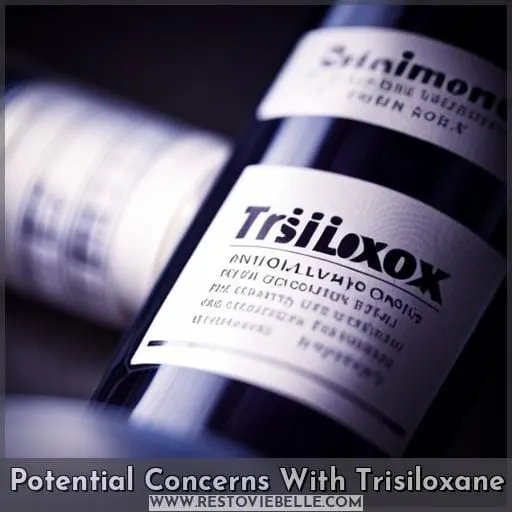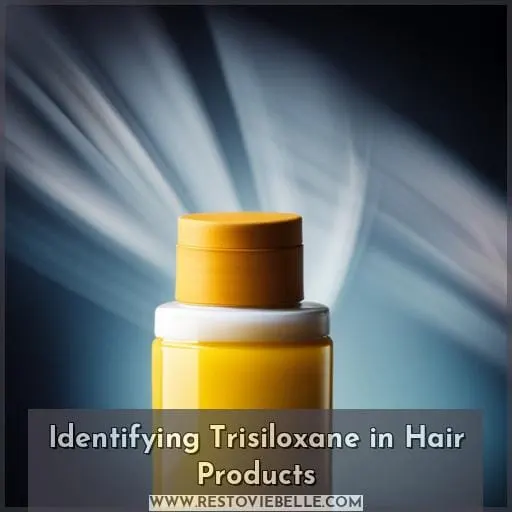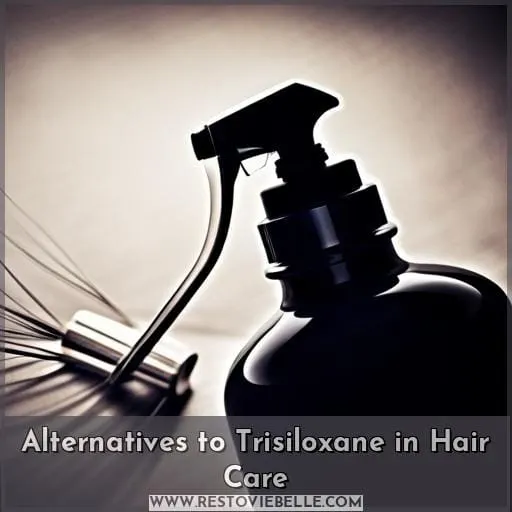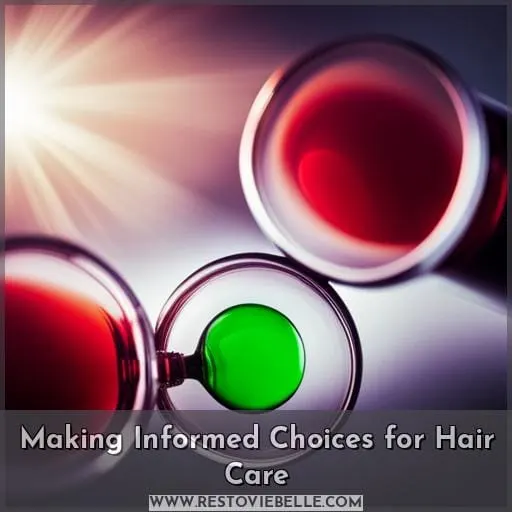This site is supported by our readers. We may earn a commission, at no cost to you, if you purchase through links.
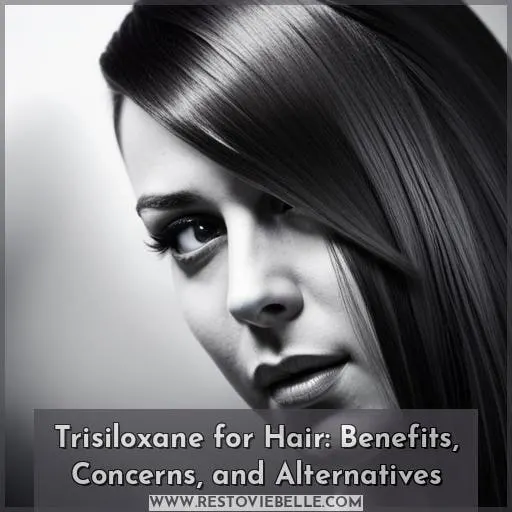 Trisiloxane is a common ingredient in hair care products, but it may not be as beneficial as you think.
Trisiloxane is a common ingredient in hair care products, but it may not be as beneficial as you think.
Learn about the potential concerns with trisiloxane and the alternatives available to you.
Table Of Contents
- Key Takeaways
- Understanding Trisiloxane for Hair
- Potential Concerns With Trisiloxane
- Identifying Trisiloxane in Hair Products
- Alternatives to Trisiloxane in Hair Care
- Making Informed Choices for Hair Care
- Frequently Asked Questions (FAQs)
- Is trisiloxane safe for use on all hair types?
- Can trisiloxane cause any long-term damage to the hair?
- Are there any specific hair products or brands that are known to contain trisiloxane?
- What are some natural alternatives to trisiloxane in hair care products?
- How can I ensure that I am making informed choices when selecting hair care products that do not contain trisiloxane?
- Conclusion
Key Takeaways
- Trisiloxane is a silicone-based chemical compound used as a cosmetic ingredient.
- Trisiloxane has been shown to have cancer risks, developmental and reproductive toxicity, potential allergies/immunotoxicity, and a moderate impact on non-reproductive organ systems.
- Trisiloxane is restricted in Canada due to environmental concerns, including bioaccumulation.
- Natural oils and butters, and water-soluble silicones are water-based alternatives to trisiloxane in hair care.
Understanding Trisiloxane for Hair
Trisiloxane is a silicone-based ingredient that’s used in many hair care products.
It’s a water-repellent substance that helps to create a smooth, silky finish on hair.
However, trisiloxane can also build up on hair and scalp, leading to dryness and irritation.
Additionally, trisiloxane isn’t biodegradable and can have negative environmental impacts.
Definition and Origin
Trisiloxane, also known as cyclotrisiloxane, is a silicone-based chemical compound used as a cosmetic ingredient. It’s restricted in Canada due to environmental concerns, including bioaccumulation.
The Skin Deep scoring system rates trisiloxane as a 3 out of 10 for hazard and a 0 out of 10 for data availability.
Purpose and Benefits
When it comes to your hair care routine, you want to make informed choices about the products you use.
Trisiloxane is a common ingredient in hair products that creates a plastic-like layer that provides shine and frizz reduction. It also offers smoothness and easier application, but it’s important to note that siloxane doesn’t treat hair or skin; it offers temporary cosmetic effects.
Potential Concerns With Trisiloxane
Trisiloxane for hair can pose risks like endocrine disruption and potential toxicity. It’s linked to fertility issues and has environmental implications. Additionally, less than 20% of cosmetic ingredients undergo safety assessment.
Endocrine Disruption and Toxicity
While trisiloxane offers several benefits for hair, there are some potential concerns to be aware of, including endocrine disruption and toxicity.
For example, trisiloxane has been shown to have:
- Cancer risk
- Developmental and reproductive toxicity
- Potential allergies/immunotoxicity
It also has a moderate impact on non-reproductive organ systems.
Additionally, trisiloxane has persistence and bioaccumulation concerns.
Environmental Implications
In addition to potential health concerns, trisiloxane may also have environmental implications.
It’s classified as a persistent, bioaccumulative, and toxic chemical by Environmental Canada and included in the Domestic Substances List under the Canadian Environmental Protection Act.
Skin Deep’s scoring system indicates that trisiloxane has moderate concerns regarding persistence and bioaccumulation, but low ecotoxicology risk.
Identifying Trisiloxane in Hair Products
To avoid trisiloxane in your hair products, you can look for the ingredient on the label.
- Cyclopentasiloxane
- D4
- PDMS
- Polydimethylsiloxane
You can also use the Skin Deep scoring system to check the safety of your hair products. Trisiloxane has a moderate hazard rating and a fair data availability rating. This means that there’s some concern about the ingredient’s cancer risk, toxicity, and persistence and bioaccumulation.
Alternatives to Trisiloxane in Hair Care
Natural oils and butters are water-based alternatives to trisiloxane in hair care. They mimic some of the benefits of silicones, but can build up on hair if not removed properly.
Water-soluble silicones are another alternative to trisiloxane. They rinse out easily and don’t leave a residue on hair.
Natural Oils and Butters
You’ll frequently find natural oils and butters listed as ingredients in hair care products as alternatives to trisiloxane. These ingredients mimic some of the silicone benefits, but they can also lead to buildup if not removed properly.
Mineral oil and wax are also used as alternatives to silicones, but they can lead to significant buildup.
The emulsifiability and molecule size of an ingredient are important factors to consider when choosing a silicone-free product.
Water-soluble silicones are the best option for those who want to avoid buildup, as they rinse off easily.
Water-Soluble Silicones
For those seeking alternatives to Trisiloxane in hair care, you can easily find water-soluble silicones that offer similar benefits.
Unlike occlusive silicones, which form a barrier and can potentially block moisture, water-soluble silicones are easily washed away and don’t cause long-term buildup.
They’ve no significant impact on hair moisture levels.
When selecting products, it’s important to consider the presence of these water-soluble silicones as they provide suitable options for individuals looking for alternatives to Trisiloxane in their hair care routine.
Making Informed Choices for Hair Care
When it comes to making informed choices for hair care, researching and selecting products that align with your values and priorities is crucial.
Opting for organic and natural options can reduce exposure to potentially harmful ingredients like trisiloxane while still providing similar benefits for your hair.
By understanding the different types of silicones, identifying alternatives, and considering factors such as buildup potential, you can make educated decisions that prioritize both the health of your hair and the environment.
Researching and Selecting Products
When researching and selecting hair care products, start by considering your specific needs and preferences.
To make informed choices for hair care, keep the following in mind:
- Check ingredient scores for safety evaluation.
- Look for data availability to ensure substantiation of claims.
- Consider any restricted status under the Environmental Protection Act or Domestic Substances List.
By understanding these factors and utilizing resources like Skin Deep’s verified mark, you can confidently select products that prioritize your liberation, power, and safety.
Opting for Organic and Natural Options
Consider exploring the option of choosing organic and natural hair care products to make informed choices for your hair care routine.
Organic hair care offers numerous benefits, including:
- Avoiding exposure to synthetic chemicals
- Reducing environmental impact
To find organic options, look for certifications from trusted organizations like The Soil Association or Ecocert.
Transitioning to organic can be done gradually by replacing one product at a time with an organic alternative.
When using organic hair care products, remember to follow the instructions provided and be patient as your hair adjusts to the new routine.
Frequently Asked Questions (FAQs)
Is trisiloxane safe for use on all hair types?
Trisiloxane is a silicone-based ingredient that’s used in a variety of personal care products, including hair care products.
Although trisiloxane is generally considered safe for use on all hair types, it’s possible that some people may experience adverse reactions to it.
If you’re concerned about the safety of trisiloxane, you should talk to your doctor or a dermatologist.
Can trisiloxane cause any long-term damage to the hair?
Trisiloxane is a silicone-based chemical that can coat the hair, leaving it smooth and shiny. However, it can also build up on the hair over time, leading to dullness and damage.
Are there any specific hair products or brands that are known to contain trisiloxane?
You may find trisiloxane in hair products such as:
- Shampoos
- Conditioners
- Styling products
- Hairsprays.
Some brands that use trisiloxane include:
- L’Oreal
- Pantene
- Suave
What are some natural alternatives to trisiloxane in hair care products?
Natural alternatives to trisiloxane in hair care products include:
- Natural oils
- Mineral oil & wax
- Water-soluble silicones
How can I ensure that I am making informed choices when selecting hair care products that do not contain trisiloxane?
You can ensure that you’re making informed choices when selecting hair care products that don’t contain trisiloxane by:
- Seeking logos from certifiers like The Soil Association or Ecocert.
- Opting for independently certified organic products.
- Transitioning to organic shampoos.
Conclusion
Ultimately, while trisiloxane is a common ingredient in hair care products, its potential concerns can’t be ignored.
The benefits it offers may not outweigh the potential risks, such as endocrine disruption and environmental implications.
As a consumer, it’s important to be aware of the presence of trisiloxane in your hair products and consider alternatives.
Natural oils and butters, as well as water-soluble silicones, can provide effective alternatives to trisiloxane.
By making informed choices and opting for organic and natural options, you can prioritize the health and wellbeing of your hair.

